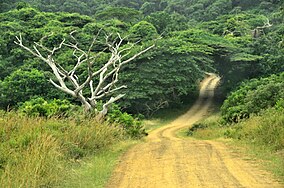
A transboundary protected area (TBPA) is an ecological protected area that spans boundaries of more than one country or sub-national entity. Such areas are also known as transfrontier conservation areas (TFCAs) or peace parks.

iSimangaliso Wetland Park is situated on the east coast of KwaZulu-Natal, South Africa, about 235 km (146 mi) north of Durban by road. It is South Africa's third-largest protected area, spanning 280 km (170 mi) of coastline, from the Mozambican border in the north to Mapelane south of the Lake St. Lucia estuary, and made up of around 3,280 km2 of natural ecosystems, managed by the iSimangaliso Authority.
The Lubombo Transfrontier Conservation Area was born out of the Peace Park Foundation’s vision to establish a network of transfrontier conservation areas in southern Africa. It straddles the border between South Africa’s KwaZulu-Natal province, southern Mozambique, and Eswatini.

Ezemvelo KZN Wildlife is a governmental organisation responsible for maintaining wildlife conservation areas and biodiversity in KwaZulu-Natal Province, South Africa. Their headquarters is in Queen Elizabeth Park situated on the northern slopes of Pietermaritzburg, the KwaZulu-Natal provincial capital. Prior to 1994, it was known as the Natal Parks Board.

Kosi Bay is a series of four interlinked lakes in the Maputaland area of KwaZulu-Natal, South Africa.
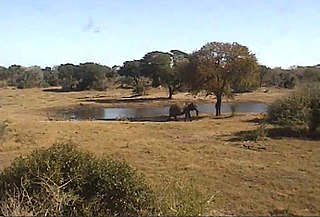
Tembe Elephant Park is a 30 012 ha game reserve in Maputaland, KwaZulu-Natal, South Africa. It is adjacent to Ndumo Game Reserve.
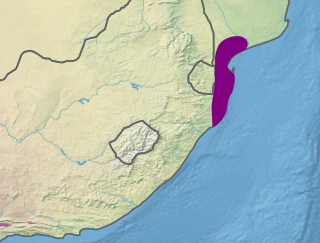
The Maputaland coastal forest mosaic is a subtropical moist broadleaf forest ecoregion on the Indian Ocean coast of Southern Africa. It covers an area of 29,961 square kilometres (11,568 sq mi) in southern Mozambique, Eswatini, and the KwaZulu-Natal Province of South Africa. Mozambique's capital Maputo lies within the ecoregion.
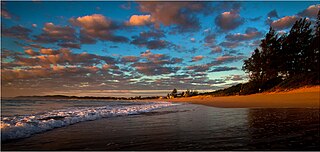
Ponta do Ouro is a town in the extreme south of Mozambique, lying on the Mozambique Channel, south of Maputo and just north of the border with South Africa. The name is Portuguese for "tip of gold", referring to a cape at the southern part of the beach. It is known for its beach, dolphins, offshore diving and deep-sea fishing.
Articles related to Mozambique include:

Sodwana Bay is a bay in South Africa on the KwaZulu Natal north coast, between St. Lucia and Lake Sibhayi. It is in the Sodwana Bay National Park, and the Maputaland Marine Reserve, and is a popular recreational diving destination. The term is commonly used to refer to both the marine reserve and the terrestrial park, as well as the geographical bay.
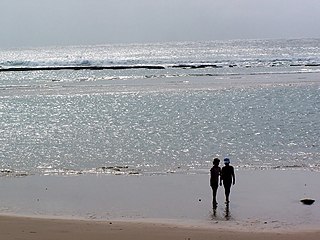
The tourism assets of Mozambique include the country's natural environment, wildlife, and cultural heritage, which provide opportunities for beach, cultural, and eco-tourism.
Usuthu-Tembe-Futi Transfrontier Conservation Area is a group of protected areas in southern Africa, straddling parts of South Africa, Mozambique and Eswatini, including the following:
Maputo Special Reserve is a nature reserve in Mozambique.

Futi Corridor a recently proclaimed protected area that forms a link between Maputo Special Reserve in Mozambique and Thembe Elephant Park in South Africa. It is a corridor of land along the Futi River. The corridor will effectively restore an historical migration and movement route of a valuable elephant population between Maputo Special Reserve and the Tembe Elephant Park in South Africa. The Futi Corridor covers 170,000 acres and the Muwai Community Association has mapped 24,710 acres of land on the western boundary to be incorporated into Maputo National Park.There is potential for the expansion of the community conservation area to the east and west of the Futi Corridor.
The Peace Park Foundation, founded in 1997 by Dr Anton Rupert, President Nelson Mandela and Prince Bernhard of the Netherlands, is an organisation that aims to re-establish, renew and conserve large ecosystems in Africa, transcending man-made boundaries by creating regionally integrated and sustainably managed networks of Transfrontier Conservation Areas (TFCAs). Peace Parks Foundation has been involved in the establishment and development of ten of the 18 TFCAs found throughout southern Africa, all of which are in various stages of development. The establishment of each TFCA, or peace park, is complex and far-reaching, and involves several phases of activity, which can take many years to achieve.
The following index is provided as an overview of and topical guide to the protected areas of South Africa:
The iSimangaliso Marine Protected Area is a coastal and offshore marine protected area in KwaZulu-Natal from the South Africa-Mozambique border in the north to Cape St Lucia lighthouse in the south.

Delagoa is a marine ecoregion along the eastern coast of Africa. It extends along the coast of Mozambique and South Africa from the Bazaruto Archipelago to Lake St. Lucia in South Africa in South Africa's Kwazulu-Natal province. It adjoins the Bight of Sofala/Swamp Coast ecoregion to the north, and the Natal ecoregion to the south. It has Africa's southernmost tropical coral reefs and mangrove forests. It is the southernmost Indo-Pacific ecoregion, marking the transition from the tropical Indo-Pacific to Temperate Southern Africa.
